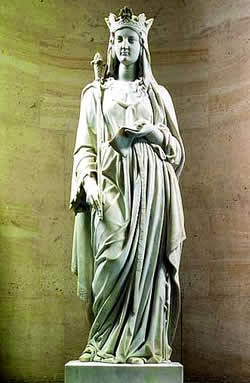 |
| Blanche of Castile |
The aging Queen Eleanor (1122–1204), her maternal grandmother, personally escorted the vivacious Blanche to France. John granted to Blanche as fiefs Gracay and Issoudun, as well as some English Crown lands. Blanche and Louis had 12 children over an 18-year period, but six children died. Their son Louis IX (1214–70) was the heir to the French throne and was later canonized as Saint Louis because of his pious and kind-hearted nature.
While waiting for the French crown, Louis claimed the English crown in Blanche’s name and she offered him her avid support, although Philip dissented. Blanche worked tirelessly and organized the invasion from Calais. Louis’s invasion of England was initially well received by the barons, but he later received only scant support from the other inhabitants.
It was also unsuccessful because King John died, and after 18 months the novelty wore off and most people offered allegiance to young King Henry III (1206–72). The Treaty of Lambeth ended Louis’s English adventure. Louis was crowned on July 14, 1223.
 |
He became ill with dysentery upon his return to Paris from the Albigensian Crusade that he had quelled and died at Montpensier on November 8, 1226. Blanche was left to act as regent for 12-year-old Louis, and she served as legal guardian of the other children.
Seeing an opportunity, the barons and the counts of Champagne, Brittany, and LaMarche (to name a few) revolted against Blanche’s somewhat suppressive hand, secretly aided by Henry. With astounding capability Blanche broke up the league of barons.
She also repeatedly repelled assaults by Henry III, who fought to have lands obtained by Philip returned to England. Blanche forced Robert de Sorbon (1201–74), founder of the University of Paris, to accept her authority. Blanche also extended French territory by adding the area of the Midi to the Crown lands, and made beneficial alliances.
 |
| Coronation of Louis VIII and Blanche of Castille |
Upon Louis’s service on the Seventh Crusade, Blanche served as regent from 1248 until 1250, when she served as co-regent with her son Alphonse until 1252. Blanche helped raise the exorbitant ransom for Louis’s release from prison in the Holy Land. Her influence on Louis remained strong until her death.
Blanche’s health failed on November 1252 at Melun. She was moved to Paris but died soon thereafter and was buried at Maubuisson. Blanche is remembered as one of the most capable rulers of the Middle Ages. Saint Louis, known in history as the best of France’s medieval monarchs, was aided during his reign by Blanche’s advice and determination.